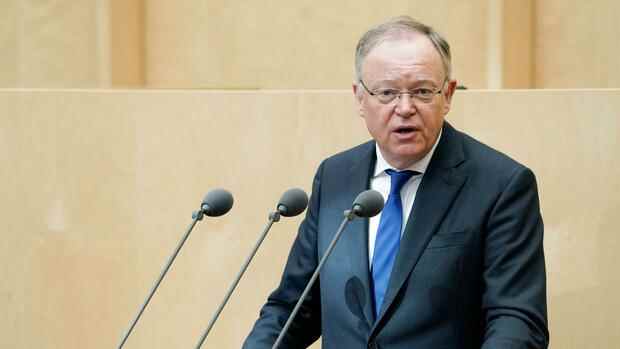The politician wants more relief for companies and citizens.
(Photo: IMAGO/Political Moments)
Dusseldorf In view of the sharp rise in energy prices, Lower Saxony’s Prime Minister Stephan Weil (SPD) has called for further relief for citizens and companies. “A temporary reduction in VAT could make sense,” Weil told the Handelsblatt.
The federal government is increasing the commuter allowance and completely canceling the EEG surcharge. “These are correct measures, but they are not enough,” emphasized Weil.
The treasury earns a lot from the taxes on the rising energy prices, said the SPD politician. “We have to talk about how we can give back part of the additional tax revenue,” says Weil.
He also called for further support for the economy. “The industry needs stable prices, especially the energy-intensive companies,” said Weil. “If the price level remains so high, then many companies will not be able to sustain it in the long term.”
Top jobs of the day
Find the best jobs now and
be notified by email.
The Prime Minister of Lower Saxony spoke out against an import ban for Russian gas and oil. “We can’t turn these deliveries to zero, then we would have a real shortage in the next heating season,” Weil said.
The prices would then rise much more and there would be serious consequences. “In Germany, however, we have a special situation due to our dependency and we cannot ignore that.”
Weil believes that longer coal-fired power plants are realistic
Weil is skeptical about longer operating times for nuclear power plants. “Before the country slips into an energy crisis, longer running times for some coal-fired power plants would be much more realistic,” said the SPD politician.
Weil has hopes for liquid gas, but only in a few years. “The potential is quite considerable, we could cover two thirds of our needs with it,” he said. For this you have to build the LNG terminals in Brunsbüttel, Wilhelmshaven and hopefully also in Stade.
“But even if we streamline the approval process, it will take some time to complete,” Weil said. “Even if it happened very quickly, it certainly wouldn’t be possible before 2024.”
In an interview with the “Tagesspiegel”, Federal Finance Minister and FDP leader Christian Lindner suggested reviewing the coalition agreement in order to reduce dependence on Russian energy imports. The contract has so far provided for a ban on new oil and gas drilling in the North and Baltic Seas. “We have to question the coalition agreement’s decision not to continue mining oil and gas in the North Sea,” said Lindner.
Lindner: no fuel price brake
Despite the record prices at the gas stations, Lindner still rejects a temporary reduction in VAT from 19 to 7 percent for diesel and petrol. “If the Union calls for a so-called fuel price brake, then they have to say what they want to cut in the budget,” said Lindner. “Or she has to admit that she is ready to take on new debts.” Statements that Lindner can now also talk to SPD Prime Minister Weil.
Meanwhile, the leader of the Greens, Ricarda Lang, called for an energy money to be introduced quickly to relieve the burden on citizens. “We need energy money as soon as possible, which is paid to all citizens,” she told the newspaper “Bild am Sonntag”. This would mean that everyone would have more money in their account, and people with little money would benefit the most.
More: Finance Minister Lindner for more gas and oil production in the North Sea
